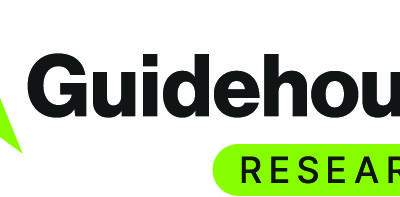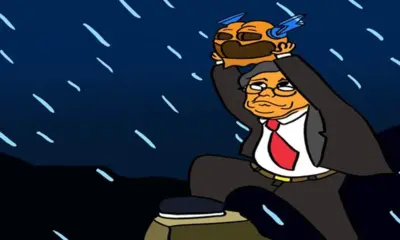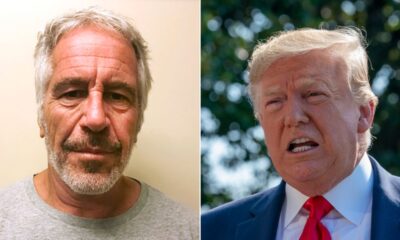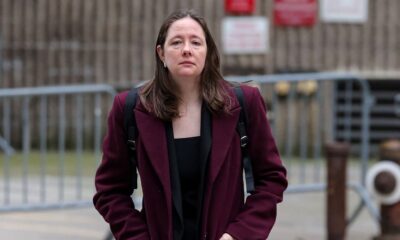Education
Ghislaine Maxwell Appeals to Supreme Court to Overturn Conviction

Ghislaine Maxwell, the former associate of Jeffrey Epstein, has requested that the Supreme Court consider her appeal to overturn her conviction for sex trafficking. In a brief submitted on Monday, Maxwell’s legal team argued that she should be protected by a non-prosecution agreement made by Epstein with federal authorities, which they contend shields her from prosecution.
Maxwell was sentenced to 20 years in federal prison in June 2022 for her role in a scheme with Epstein to groom and sexually abuse underage girls. Her attorneys assert that the focus of the case should be on the promises made by the government rather than Epstein’s actions. “This case is about what the government promised, not what Epstein did,” they stated in their filing.
In her appeal, filed in April, Maxwell claims the non-prosecution agreement secured by Epstein as part of his guilty plea in 2008 should apply to her as well. The 2nd US Circuit Court of Appeals had previously ruled against her, determining that the agreement with prosecutors in Florida did not extend to New York authorities. Maxwell’s legal team contends that there is inconsistency among appeals courts regarding the binding nature of such agreements at a national level.
Legal Arguments and Political Context
Maxwell’s attorney, David Oscar Markus, emphasized the significance of the agreement, stating, “President Trump built his legacy in part on the power of a deal – and surely he would agree that when the United States gives its word, it must stand by it.” The attorney called upon both the Supreme Court and the former president to recognize the injustices faced by Maxwell, arguing that she is being unfairly blamed for Epstein’s crimes, particularly when a promise of non-prosecution was allegedly made.
Recently, Maxwell met with Deputy Attorney General Todd Blanche for questioning related to the ongoing political controversy surrounding the Trump administration’s handling of Epstein’s files. These discussions were not referenced in the Supreme Court filing. The Trump administration has defended both the charges against Maxwell and her conviction as the case progresses through the judicial system.
In its brief submitted on July 14, the Justice Department countered Maxwell’s claims, stating, “Petitioner was not a party to the relevant agreement. Only Epstein and the Florida USAO were parties.”
The Broader Implications
The Supreme Court is expected to announce whether it will take up the case this fall. Maxwell’s appeal raises critical questions about the enforceability of non-prosecution agreements and their implications for individuals connected to high-profile cases.
Epstein, who pleaded guilty to state prostitution charges in 2008, faced federal sex trafficking charges in July 2019 but died by suicide in prison shortly thereafter. The legal battles surrounding his estate and associates continue to unfold, drawing attention to the complexities of justice in cases involving powerful figures.
Maxwell’s defense hinges on the assertion that the government has misinterpreted the terms of the non-prosecution agreement. “The government’s argument, across the board, is essentially an appeal to what it wishes the agreement had said, rather than what it actually says,” she stated in her appeal to the Supreme Court.
As the legal proceedings continue, the outcome of Maxwell’s appeal may set significant precedents regarding how non-prosecution agreements are understood and enforced in the future, particularly in cases involving allegations of sexual exploitation and abuse.
-

 Lifestyle2 weeks ago
Lifestyle2 weeks agoBelton Family Reunites After Daughter Survives Hill Country Floods
-

 Education2 weeks ago
Education2 weeks agoWinter Park School’s Grade Drops to C, Parents Express Concerns
-

 Technology2 weeks ago
Technology2 weeks agoMeta Initiates $60B AI Data Center Expansion, Starting in Ohio
-

 Technology2 weeks ago
Technology2 weeks agoByteDance Ventures into Mixed Reality with New Headset Development
-

 Lifestyle2 weeks ago
Lifestyle2 weeks agoNew Restaurants Transform Minneapolis Dining Scene with Music and Flavor
-

 Technology7 days ago
Technology7 days agoMathieu van der Poel Withdraws from Tour de France Due to Pneumonia
-

 Technology2 weeks ago
Technology2 weeks agoGlobal Market for Air Quality Technologies to Hit $419 Billion by 2033
-

 Technology2 weeks ago
Technology2 weeks agoRecovering a Suspended TikTok Account: A Step-by-Step Guide
-

 Health2 weeks ago
Health2 weeks agoSudden Vision Loss: Warning Signs of Stroke and Dietary Solutions
-

 Technology2 weeks ago
Technology2 weeks agoAnalysts Highlight Top 5 Altcoin Presales Ahead of Market Surge
-

 Technology2 weeks ago
Technology2 weeks agoTrump Faces Internal Struggles Over Epstein Files Handling
-

 Technology2 weeks ago
Technology2 weeks agoUK Initiates Relocation Scheme for Afghans After Data Breach





















